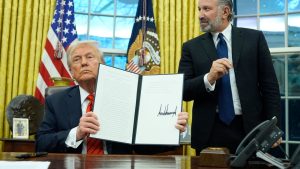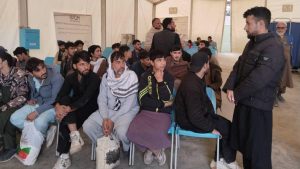The George C. Marshall European Center for Security Studies launched the second iteration of its Future Lab and Research Workshop Feb. 4, bringing together 22 distinguished alumni to analyze strategic competition and develop new approaches to integrated deterrence amid evolving global security challenges.
The three-week initiative encourages in-depth analysis of regional security dynamics, leveraging the expertise of Marshall Center faculty and its extensive research library. Participants from regions including Africa, the Middle East, Asia, the Black Sea, and South Caucasus, contribute unique perspectives designed to push the boundaries of current strategic frameworks.
Retired Brig. Gen. Rolf Wagner, German Deputy Director of the Marshall Center, highlighted the program’s significance in addressing contemporary security threats, including the use of deterrence, which he described as the cornerstone of his early military career during the challenging days of the Cold War.
“While the geopolitical landscape has shifted dramatically since then, the fundamental principles of deterrence remain valid. What’s fascinating – and crucial – is exploring how these principles have evolved over the past decade, especially in the heart of Europe,” he said. “This workshop offers a unique space for alumni to engage and exchange ideas. I’m eager to listen to your insights, challenge old paradigms, and see how your perspectives shape the future of deterrence strategies.”
Building on last year’s future lab on normative strategic competition, co-hosted with the German Federal Ministry of Defense, this year’s program seeks to deepen research on integrated deterrence, addressing both conventional and hybrid threats, and refining strategic approaches to emerging security challenges.
“One of the key challenges in policymaking today is the tendency to rely on outdated frameworks for addressing emerging threats. This program offers a unique space to think creatively and explore difficult questions,” said GCMC alumna Katarina Schwertnerova, senior advisor for cybersecurity polices for EU strategy. “Unlike decision-makers dealing with crises involving human lives, financial resources, or military assets, we have the freedom to think beyond existing limitations. By asking “what if?” and pushing scenarios to their extremes, we can identify constraints in decision-making and propose solutions that might otherwise be overlooked.”
Since Russia’s annexation of Crimea in 2014, deterrence and defense have returned to the forefront of NATO’s strategic priorities, complicated by emerging technologies like artificial intelligence and autonomous weapons systems. Marshall Center alumni Ambassador Viacheslav Yatsiuk, Ukrainian Ministry of Foreign Affairs, spoke about workshop’s central theme of countering, deterring, and preventing Russia aggression on the European community.
“What’s at stake here is not only the situation in Ukraine, but the fundamental principles agreed upon after the two most devastating world wars: That the frontiers among states cannot be arbitrarily altered and that the independence of sovereign states must be respected,” he said. “If Russia prevails, it might embolden other states in various regions to take similar aggressive actions. On the other hand, if Ukraine prevails, it will mean that freedom, the international order, and international law will ultimately prevail.”
The Future Lab program unfolds in two phases. The initial research workshop phase involves small-group discussions analyzing Russian intentions, Western deterrence strategies, and gaps in NATO’s frameworks. In the second phase, participants will develop their research into draft articles for potential publication in strategic policy outlets.
Throughout the discussions, participants examined Russia’s strategic objectives, assessed NATO’s deterrence posture across varying threat levels, and analyzed the Alliance’s evolving approach to hybrid warfare. These insights provide a foundation for evaluating NATO’s current deterrence framework, as outlined in its 2020 Concept for Deterrence and Defense of the Euro-Atlantic Area.
“It is very important that the topic of our event was to think about how our societies, our political establishments, and our military establishments can be prepared to counter those efforts aimed at dismantling the international security order,” said Ambassador Viacheslav Yatsiuk, Ukrainian Ministry of Foreign Affairs and Former Ukrainian Ambassador to Norway. “This is about a group of states – and Russia is one of them – challenging the existing international order and the established rules of international law.”
Workshop discussions will also address Russia’s counter-deterrence strategies, the interplay between resilience and deterrence, and the role of non-military factors such as societal cohesion in comprehensive security strategies.
The Future Lab and Research Workshop generates timely insights on security issues while strengthening the Marshall Center’s research capabilities. By leveraging its alumni network, the program fosters professional growth, encourages the exchange of ideas, and contributes to actionable policy recommendations. As this annual series evolves, the contributions of its participants will shape future strategic discourse, reinforcing the Marshall Center’s mission to advance global security through education, research, and dialogue.
“I can only express hope and encourage you, your colleagues, and the leadership of the Marshall Center to preserve this unique institution. It is quite unique in Europe,” Ambassador Yatsiuk said. “It helps our American partners to be engaged in European affairs, helps our German friends understand why their leadership is important, and encourages all nations to be active participants in understanding that this is our common home.”
| Date Taken: | 02.13.2025 |
| Date Posted: | 02.13.2025 08:55 |
| Story ID: | 490700 |
| Location: | GARMISCH PARTENKIRCHEN, BAYERN, DE |
| Web Views: | 6 |
| Downloads: | 0 |
PUBLIC DOMAIN

This work, GCMC’s Future Lab Workshop Focuses on Strategic Competition, Integrated Deterrence, by Sarah Loicano, identified by DVIDS, must comply with the restrictions shown on https://www.dvidshub.net/about/copyright.







